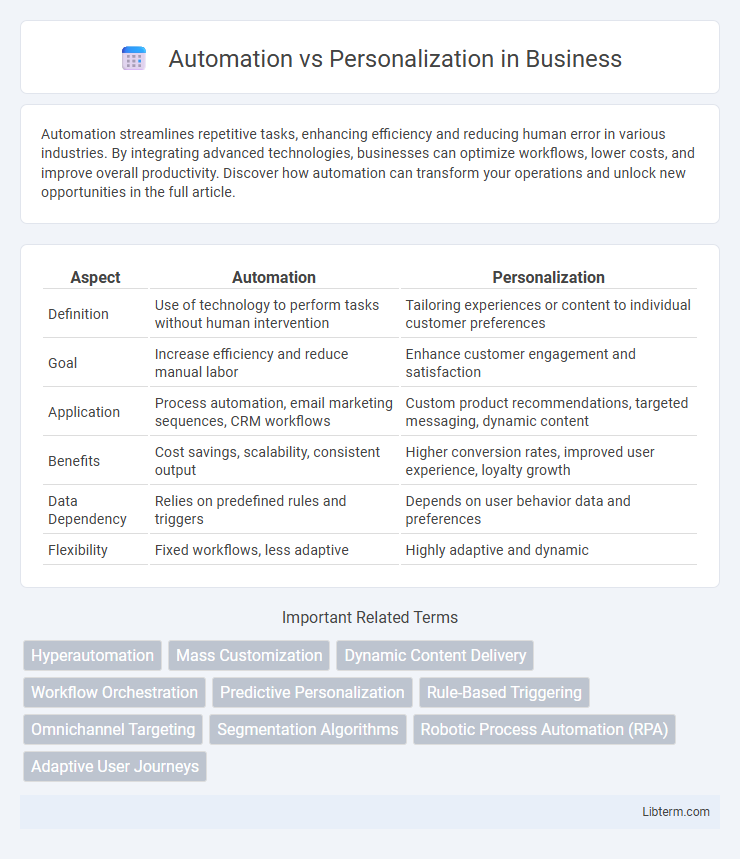Automation streamlines repetitive tasks, enhancing efficiency and reducing human error in various industries. By integrating advanced technologies, businesses can optimize workflows, lower costs, and improve overall productivity. Discover how automation can transform your operations and unlock new opportunities in the full article.
Table of Comparison
| Aspect | Automation | Personalization |
|---|---|---|
| Definition | Use of technology to perform tasks without human intervention | Tailoring experiences or content to individual customer preferences |
| Goal | Increase efficiency and reduce manual labor | Enhance customer engagement and satisfaction |
| Application | Process automation, email marketing sequences, CRM workflows | Custom product recommendations, targeted messaging, dynamic content |
| Benefits | Cost savings, scalability, consistent output | Higher conversion rates, improved user experience, loyalty growth |
| Data Dependency | Relies on predefined rules and triggers | Depends on user behavior data and preferences |
| Flexibility | Fixed workflows, less adaptive | Highly adaptive and dynamic |
Understanding Automation and Personalization
Automation streamlines repetitive tasks through algorithm-driven processes, increasing efficiency and consistency across various platforms. Personalization tailors user experiences by analyzing individual preferences, behaviors, and data to deliver customized content or services. Understanding automation versus personalization involves recognizing automation's focus on scalability and uniformity, while personalization emphasizes user-centric adaptability and engagement.
Key Benefits of Automation in Modern Business
Automation in modern business enhances efficiency by streamlining repetitive tasks and reducing human error, leading to significant time and cost savings. It enables scalable operations through consistent workflow execution, allowing businesses to handle higher volumes of work without compromising quality. Data-driven automation also improves decision-making by providing real-time analytics and insights, boosting overall productivity and customer satisfaction.
The Power of Personalization in Customer Engagement
Personalization significantly enhances customer engagement by delivering tailored experiences based on individual preferences, behaviors, and purchase history. Unlike automation's broad, standardized approach, personalization leverages data-driven insights to create meaningful interactions that boost customer loyalty and increase conversion rates. Implementing advanced AI algorithms and real-time analytics enables brands to dynamically adapt content and offers, fostering deeper emotional connections and higher satisfaction levels.
When to Choose Automation Over Personalization
Automation should be chosen over personalization when handling large volumes of repetitive tasks that require efficiency and consistency, such as mass email campaigns or transaction processing. Businesses benefit from automation in scenarios demanding quick response times and standardized interactions, like chatbot support or order fulfillment. Automation optimizes resource allocation and reduces human error without compromising customer experience in high-scale environments.
Challenges of Over-Automation
Over-automation can lead to reduced customer engagement by creating impersonal interactions that fail to address individual preferences and needs. Businesses risk alienating their audience when automated processes overlook contextual nuances and emotional cues essential for personalization. Balancing automation with human touchpoints is critical to maintaining meaningful connections and ensuring effective customer experience management.
Balancing Personalization with Efficiency
Balancing personalization with efficiency requires integrating advanced automation tools that use customer data to deliver tailored experiences without sacrificing speed. Machine learning algorithms analyze user behavior to create dynamic content while streamlining repetitive tasks, enhancing overall operational productivity. Leveraging AI-driven personalization ensures businesses can maintain engagement and customer satisfaction alongside scalable, efficient workflows.
Case Studies: Success Stories in Automation and Personalization
Case studies reveal that companies leveraging automation in customer service reduce response times by up to 70%, enhancing operational efficiency and customer satisfaction. Personalization strategies, exemplified by Netflix's algorithm-driven recommendations, increase user engagement and retention rates by over 80%. Combining automation with personalization, Amazon's dynamic pricing and tailored marketing campaigns deliver higher conversion rates, demonstrating significant revenue growth and competitive advantage.
Tools and Technologies Driving This Debate
Automation tools like AI-powered chatbots, CRM platforms, and marketing automation software streamline repetitive tasks, enhancing efficiency and scalability for businesses. Personalization technologies leverage machine learning algorithms, customer data platforms (CDPs), and behavioral analytics to tailor experiences and communications based on individual user preferences and behaviors. The ongoing debate centers on balancing the efficiency of automation with the deep customer engagement enabled by advanced personalization technologies.
Measuring the Impact: Metrics and KPIs
Measuring the impact of automation and personalization relies on key metrics such as conversion rates, customer lifetime value (CLV), and engagement rates. Analyzing click-through rates (CTR) and average order value (AOV) helps differentiate the effectiveness of automated campaigns versus personalized experiences. Monitoring customer retention and satisfaction scores further adjusts strategies to optimize both automation and personalization efforts for maximum ROI.
Future Trends: Merging Automation with Personalization
Future trends in marketing emphasize the integration of automation and personalization to deliver highly targeted customer experiences at scale. Advanced AI algorithms analyze real-time data to tailor content, offers, and interactions based on individual preferences while automating repetitive tasks. This convergence enhances customer engagement, improves conversion rates, and drives efficiency in digital marketing strategies.
Automation Infographic

 libterm.com
libterm.com